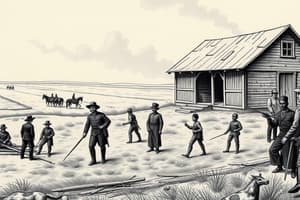Podcast
Questions and Answers
What was the primary goal of the Union during the Civil War?
What was the primary goal of the Union during the Civil War?
- To wear down the Confederate will to fight through widespread destruction (correct)
- To outlast the Confederate forces by maintaining defensive positions
- To win battles on Southern soil to demoralize Confederate forces
- To gain control of the Mississippi River and surrounding territories
Which battle is known as the turning point of the Civil War?
Which battle is known as the turning point of the Civil War?
- Battle of Antietam
- Battle of Gettysburg (correct)
- Battle of Vicksburg
- Battle of Fort Sumter
Which of the following battles took place first?
Which of the following battles took place first?
- Battle of Gettysburg
- Battle of Antietam
- Battle of Vicksburg
- Battle of Fort Sumter (correct)
What was one consequence of the Union's victory at the Battle of Antietam?
What was one consequence of the Union's victory at the Battle of Antietam?
What was a requirement for Southern states under Radical Reconstruction?
What was a requirement for Southern states under Radical Reconstruction?
Which statement best describes Abraham Lincoln's approach to slavery during his presidency?
Which statement best describes Abraham Lincoln's approach to slavery during his presidency?
What was the primary economic foundation of the Northern states during Lincoln's presidency?
What was the primary economic foundation of the Northern states during Lincoln's presidency?
What was the significant effect of the Emancipation Proclamation issued by Lincoln?
What was the significant effect of the Emancipation Proclamation issued by Lincoln?
Which battle or campaign is William T. Sherman notably associated with?
Which battle or campaign is William T. Sherman notably associated with?
Who served as the president of the Confederate States of America?
Who served as the president of the Confederate States of America?
What was one consequence of General Thomas “Stonewall” Jackson's death?
What was one consequence of General Thomas “Stonewall” Jackson's death?
What was a major factor in the Union's victory at Appomattox Courthouse?
What was a major factor in the Union's victory at Appomattox Courthouse?
How did Lincoln's Gettysburg Address relate to the American Revolution?
How did Lincoln's Gettysburg Address relate to the American Revolution?
What was the primary purpose of the Missouri Compromise?
What was the primary purpose of the Missouri Compromise?
Which event directly led to the start of the Mexican-American War?
Which event directly led to the start of the Mexican-American War?
What did the Treaty of Guadalupe-Hidalgo achieve for the United States?
What did the Treaty of Guadalupe-Hidalgo achieve for the United States?
What was a significant outcome of the Compromise of 1850?
What was a significant outcome of the Compromise of 1850?
What was the significance of the Dred Scott vs. Sanford ruling?
What was the significance of the Dred Scott vs. Sanford ruling?
Which of the following best describes sectionalism?
Which of the following best describes sectionalism?
What did John Brown believe was his divine mission?
What did John Brown believe was his divine mission?
Which of the following candidates ran for president in the election of 1860?
Which of the following candidates ran for president in the election of 1860?
Flashcards
Missouri Compromise
Missouri Compromise
A compromise settling the issue of slavery in newly acquired territories, primarily from the Louisiana Purchase. It balanced the number of free and slave states.
Manifest Destiny
Manifest Destiny
The belief that the United States was destined to expand across North America, often justified by religious or nationalistic ideals.
Mexican-American War
Mexican-American War
Conflict between the United States and Mexico over territory, notably the annexation of Texas and the US claim to the Rio Grande border.
Compromise of 1850
Compromise of 1850
Signup and view all the flashcards
Sectionalism (Civil War)
Sectionalism (Civil War)
Signup and view all the flashcards
Kansas-Nebraska Act
Kansas-Nebraska Act
Signup and view all the flashcards
Dred Scott v. Sanford
Dred Scott v. Sanford
Signup and view all the flashcards
Presidential Election of 1860
Presidential Election of 1860
Signup and view all the flashcards
Confederate Advantage
Confederate Advantage
Signup and view all the flashcards
Battle of Antietam
Battle of Antietam
Signup and view all the flashcards
Battle of Vicksburg
Battle of Vicksburg
Signup and view all the flashcards
Battle of Gettysburg
Battle of Gettysburg
Signup and view all the flashcards
Presidential Reconstruction
Presidential Reconstruction
Signup and view all the flashcards
Lincoln's Election
Lincoln's Election
Signup and view all the flashcards
Northern Economy
Northern Economy
Signup and view all the flashcards
Southern Economy
Southern Economy
Signup and view all the flashcards
Emancipation Proclamation
Emancipation Proclamation
Signup and view all the flashcards
General Robert E. Lee
General Robert E. Lee
Signup and view all the flashcards
General Ulysses S. Grant
General Ulysses S. Grant
Signup and view all the flashcards
Sherman's March to the Sea
Sherman's March to the Sea
Signup and view all the flashcards
Gettysburg Address
Gettysburg Address
Signup and view all the flashcards
Study Notes
Missouri Compromise
- Slavery was a major issue arising from the Louisiana Purchase
- This issue concerned the balance of free and slave states
- Henry Clay proposed a compromise: restricting slavery in most of the Louisiana territory, except Missouri
- Maine (free) and Missouri (slave) were admitted to the Union as separate states
- This aimed to maintain balance between free and slave states
Polk and Manifest Destiny
- Polk, the 11th president, pursued territorial expansion for the United States
- Included expansion into Mexico and Oregon Territory
- Manifest Destiny: A belief that the U.S. was destined to expand across North America
- This spurred the Mexican War
Mexican War
- Triggered by the annexation of Texas and the border dispute with Mexico
- Treaty of Guadalupe Hidalgo: Established the Rio Grande as the border between the U.S. and Mexico
- Mexico ceded California, Nevada, New Mexico to the U.S., in exchange for $$15 million USD
Sectionalism
- Political loyalty to one's region of the country
- The Mexican-American War heightened conflicts between pro- and anti-slavery groups over western territories
- Concerns arose over whether new territories would allow slavery
Compromise of 1850
- Admitted California as a free state
- Required citizens to assist in apprehending runaway slaves
- Abolished the slave trade in Washington D.C.
Causes of the Civil War
- Kansas-Nebraska Act: Allowed these states to decide on the issue of slavery themselves (repealing the Missouri Compromise and Compromise of 1850)
- Dred Scott vs. Sanford (1857): Slaves were considered property, protected by the US constitution
- John Brown's raid: Brown led a group against a federal armory believing it was his duty to end slavery
Northern and Southern Economies
- North: Industry and trade
- South: Agriculture, heavily reliant on slave labor
- Differences in economies and social structures contributed to the widening divide between North and South
Presidential Election of 1860
- Lincoln's election as the first Republican president triggered Southern secession
General Robert E. Lee
- Highly capable Confederate general (Union commander Ulysses S. Grant was an aggressive approach to winning the Civil War)
William T. Sherman
- Union General known for the Atlanta Campaign and his march to the sea (Savannah)
Reconstruction
- Presidential Reconstruction: Southern states readmitted to the Union if 10% of voters pledged loyalty and abolished slavery
- Radical Reconstruction: Stronger measures passed the 13th, 14th and 15th Amendments (ending slavery, and giving rights to formerly enslaved people)
Black Codes
- Laws enacted in the South to restrict the freedom and rights of African Americans
- Part of the resistance against the freedoms given after slavery
Freedmen's Bureau
- Established to assist newly freed slaves in adjusting to freedom
- Provided essential services: food, clothing, and education, to assist African Americans
- Supported the establishment of black communities.
Studying That Suits You
Use AI to generate personalized quizzes and flashcards to suit your learning preferences.




